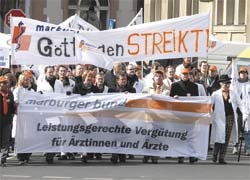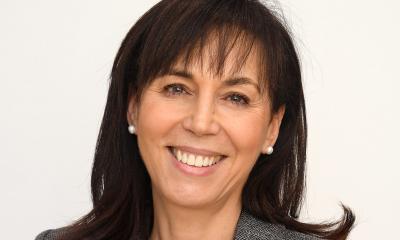Militancy among medics Will it spread?
Dr Lutz Retzlaff, Medical journalist
Common unrest about pay and conditions leads doctors to strike in Germany and Spain. A report from Germany.

As of 28 April, doctors at university hospitals and large district hospitals had been on strike for about five weeks. Resentment is particularly prevalent among young, assistant doctors. One of the main demands is for an increase in the basic salary by around 30%, along with better working conditions. There is also a call for a special labour agreement for doctors.
Initially, Ulla Schmidt, Federal Minister of Health and member of the SPD (Social Democratic Party of Germany) appeared to be sympathetic towards some of the doctors’ demands. The Minister agrees that doctors have to cope with too much bureaucracy, although it remains to be seen how they are to be relieved of this burden. On the other hand, Schmidt publicly spoke out against a flat-rate increase in salaries. One of the government’s objectives is a reduction in ancillary wage costs, which can be influenced through the level of spending in the healthcare sector. However, in Germany, the influence of politics in this area is limited. Schmidt has already made it clear that she is not involved in the tariff policies.
The regional district hospitals are currently affected by the strikes, but they only have indirect means of becoming involved in the tariff negotiations. They are represented by the Employer’ Association of German Länder (TdL) and its leader, the Minister of Finance for Lower Saxony, Hartmut Möllring of the CDU (Christian Democratic Union of Germany). The Marburger Bund (mB), led by chairman Dr Frank Ulrich Montgomery, represents the doctors employed by these hospitals. This union of publicly-employed doctors has, by its own account, around 100,000 members and is making the following key demands to the Employer’s Association of Germany Länder:
• Reinstatement of contractually protected working conditions
• Retraction of the termination of labour agreements on working hours and on Christmas bonus and holiday pay, which has led to a reduction in income by 15 - 20%
• A means off increasing doctors’ salaries by about 30%
• Full compensation for all work carried out
• Regular working hours
• Abolition of short-term labour contracts
• A reduction of bureaucratic tasks
• Provision for research and teaching to be done during regular working hours
The latest offer made by employers has been rejected as inadequate. The Marburger Bund has called for nationwide open-ended strikes, every Monday to Wednesday, for all hospitals governed by the Employers’ Association of German Länder. There have been mass rallies in different German cities each week in which 4,000 to 6,000 doctors participated. These demonstrations are supported by additional, regional acts of protest. According to the Marburger Bund, over 11,000 doctors at university hospitals and district hospitals ‘put down their tools’ on 25 April 2006. The union counted over 5,000 participants at the central mass rally in Dusseldorf - in an area where 22,000 doctors work under the jurisdiction of the regional Employers’ Association.
The university hospitals affected by the strike are looking at a loss in revenue on strike days of between €300,000 - €500,000, although the strikes that, so far, have been limited to two days a week, have not brought the hospitals to a complete standstill.
The economic losses could grow even further. The Marburger Bund has called for a total strike from 15-19 May. The effects are cushioned by different emergency agreements that individual hospitals have with their doctors. Overall, this means that a ‘weekend service’ is in place - selective operations are postponed. There is, of course, room for discussion as to the question of what is selective and what is not.
The tariff negotiations in the hospitals are not limited to the institutions governed by the Länder. There are currently also negotiations with the Federation of Communal Employers’ Associations (VKA), with doctors again being represented by the Marburger Bund. As long as it looks like these negotiations have a real prospect of achieving satisfactory results, the institutions under the jurisdiction of the VKA are spared the strikes. However, should negotiations fail there have already been threats that the current protest actions also will be expanded to these hospitals.
These tariff negotiations must not be confused with the acts of protest carried out by general practitioners and specialist doctors in private practice. Because they are considered to be self-employed the word strike does not seem appropriate. However, surgery closures and demonstrations are to increase the political pressure, because doctors who work outside hospitals are also unhappy with the increase in bureaucratic tasks and their conditions of pay. The mood amongst doctors in general is grim.
01.05.2006





